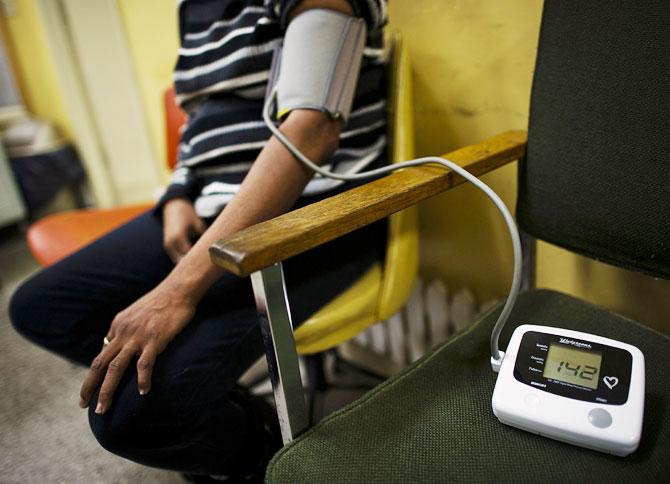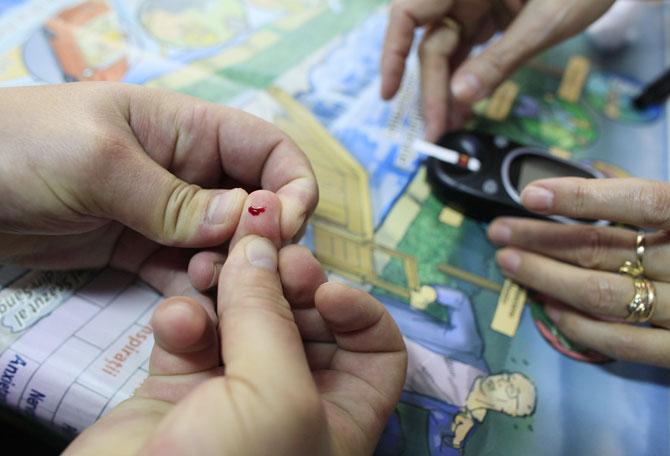Photographs: Dadang Tri/Reuters Abhishek Mande Bhot
Your office is the cause of your ill health says fitness expert Namita Jain in her new book 9 to 5 Fit. (Purchase a copy here)
- Stress, anxiety, pressure, deadlines can put your life out of gear before you know it.
- It isn't difficult to go from S to XL.
- Offices are minefield of bad diets that lead to bad health.
- Sedentary lifestyle is this generation's biggest bane.
- If you've gained weight since you first started working, you should be reading this to the very last page.
Namita Jain's latest fitness book 9 to 5 Fit bases itself on the premise that your job makes you fat. Jain is a clinical fitness specialist at one of Mumbai's prominent hospitals and also offers guidance in aerobics, yoga, Pilates, step-workout and interval training.
Much of what she writes in 9 to 5 fit derives from her experience that spans over quarter of a century and her own initial battles with those extra kilos.
READ: Is your office making you FAT? Here's how to lose those kilos
One of her early learnings was that overeating cannot always be compensated by extra time at the gym. A fit body is made as much in the kitchen as it is made in the gym, she says laying stress on one's eating habits.
She speaks extensively on the issue in her last book, The Four-week Countdown Diet in which she advises to go easy on your dinners and full throttle with breakfast.
(Read more on that here and here)
In 9 to 5 Fit, Jain turns her attention to the office space where we spend most of our waking hours. Page after page, chapter after chapter, she brutally lists out all the things we do wrong at work, which lead to the piling kilos.
Here, she lists out the primary health issues that working professionals face today:
Acidity
Jain says that about 70 per cent of clients who approach her for weight-loss solutions suffer from acidity. Many of them, she writes in her book, are addicted to antacid tablets.
She says: "Much of the problem here is related to how people eat.
Many of us eat way too fast. Because we eat fast, we end up eating too much and before we know it, we've overeaten.
Think of your stomach as a mixie. If you fill it to the top, the mixie won't churn. The more you eat, the more taxing it is on the digestive system." she says.
"Eat slowly," she advises, "If you eat slowly, you learn to savour the food. And the more you savour, the lesser you end up eating."
In the chapter on acidity, through real-life cases Jain stresses on the need to slow down. "Turn off your mobile phone when you're eating," she says. "Avoid watching television and focus only on your meal. You'll see the difference."
High blood pressure
Image: According to Jain, 35 per cent of people who suffer from high blood pressure don't even know it. Seen here is a patient getting her blood pressure checked at a clinic.Photographs: Mark Blinch/Reuters
High blood pressure is more common than you can imagine, Jain says. "Yet, I am always surprised to see how many of my clients -- many of them in their 20s suffer from borderline blood pressure. Sometimes it is genetic but often it is related to lifestyle habits."
According to her 35 per cent of those who suffer from high blood pressure don't even know it.
High salt in food, obesity, smoking, stress, alcohol consumption and sedentary lifestyle are some of the primary causes of high blood pressure.
Besides quitting smoking and reducing salt intake, Jain advises her readers to start with some basic exercises and be regular at it.
"Those who are physically active have 25-50 per cent lower risk of developing hypertension," she writes in her book.
Cardiovascular exercises such as walking, jogging, swimming, cycling not only keep the heart ticking and help you unwind but also keep the blood pressure low, Jain says.
"Besides this, basic breathing exercises that can be done at your seat help you de-stress. These don't require any accessories and can be done as many times as you can in the course of the day."
Jain also lists out dietary dos and don'ts in the book:
- Avoid red meat. Have fish and white meat instead.
- Make your poultry skin-free before cooking.
- Choose low-fat milk instead of whole milk. Always.
- Have not more than three egg yolks a week.
- Say 'no' to packaged and pre-cooked foods.
- Stay away from too much salt.
- Consume fruits and vegetables every day.
- Reduce fats such as oil, butter, ghee and cream from your diet.
ALSO READ: Beat stress, blood pressure and diabetes. Here's how!
Beer belly/Obesity
Image: A trip to the nearest bar is often the norm these days than an exception says Namita Jain.Photographs: Kai Pfaffenbach/Reuters
Sitting is new smoking and the root cause of several of this generation's health issues. Sedentary lifestyle, stress, eating and drinking out regularly, skipping breakfast, irregular eating hours, sugar overload and lack of exercise are just some of the factors that cause for the kilos to pile on.
Then of course there is alcohol.
"Whether one is celebrating a pay hike or grieving the loss of an account, a trip to the nearest bar is the norm these days," she points out in the book adding that Indians tend to consume a high-carbohydrate diet rich in fat which makes potbellied men a far more common sight than in other countries.
Jain's advice to consuming alcohol is along the same lines as her food-related one.
"Go slow," she says, "Don't guzzle down your drink."
Drink plenty of water before you start drinking. Her thumb rule is for every serving of alcohol, consume a glass of water.
Jain also advises against dessert wines asking her readers to opt instead for dry red and white wines and suggests compensating calories in the other meals of the day.
"Your breakfast could be unsweetened oat porridge. Lunch could be one wheat roti with a large helping of fresh salad. And your evening snack could be roasted chana and lots of water," she writes.
ALSO READ: 10 ways to get rid of obesity
Diabetes
Image: Diabetes is becoming increasingly common amongst working professionalsPhotographs: Radu Sigheti/Reuters
According to the 2011 Indian Council of Medical Research study, there are 62.4 million diabetes patients in India. For every one person suffering from the disease, there is another who has a pre-diabetic condition.
It is quite correctly called a lifestyle disease, Jain says, adding that she isn't the least bit surprised at it becoming increasingly common amongst working professionals.
We have erratic food habits, live sedentary lifestyles and under much stress. These are the very causes of the disease, she points out.
The tricky part about diabetes, she says, is also that it leads to kidney ailments, eye-related issues and disorders of the nervous system as well as heart ailments.
Jain lists out the usual routine that includes a low-fat diet, fish and chicken over red meat, grilling and baking over deep frying and a physical activity.
"Use relaxation techniques like meditation to help calm the body and mind and get adequate sleep," she says in the book. "It reduces fatigue, anxiety and stress."
ALSO READ: 10 ways to prevent diabetes
High cholesterol
Image: It doesn't matter whether you're veg or non veg, unhealthy eating habits WILL lead to high cholesterol.Photographs: Lucy Nicholson/Reuters
Yet another health issue that many seem to believe only affects non-vegetarians is high cholesterol.
Like all other health hazards, sedentary lifestyle and unhealthy eating habits are some of the major causes for high levels of cholesterol.
"It shouldn't be the end of the world for you," Jain assures.
Among other things, give up egg yolks, limit your alcohol intake, drink two to three litres of water every day; stop smoking, she advises stressing on regular exercises.
ALSO READ: 23 foods to lower cholesterol
Stiffness
Image: Practice some basic stretches to get rid of stiffness around your neck and shoulder areas.Photographs: Hitesh Harisinghani/Rediff.com
Perhaps not as much of a killer as some of the other ailments listed earlier, stiffness is a very common ailment amongst working professionals.
If you're reading this sitting behind your office desk right now, it shouldn't come as a surprise to you. Chances are your neck and shoulders are hurting because you haven't flexed them enough and have been using them to type emails and make presentations all day long.
"Many of us don't realise how stiff we can get when we're working. Most of our working hours are spent looking at the screen with fingers on the keyboard or the mouse. We don't even realise when we're contracting our muscles," Jain says.
"So many people I know of, including those who are on the field tell me they have stiff shoulders.
The key is to practice some basic stretches and bring about some amount of flexibility.
Set a reminder and take a walk every hour or so. While you're at your desk, stretch your hands up in the air and bring them down. Repeat this a few times over and you'll notice the difference almost immediately.
It also often doesn't help that we sit in air-conditioned offices, which makes our muscles stiffer still.
Stay active; there's no better way to stay fit," she says.







Comment
article